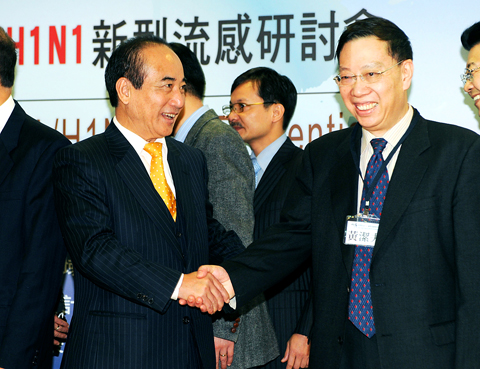The Centers for Disease Control (CDC) yesterday said that a 32-year-old pregnant woman in Taichung died of A(H1N1) influenza on Saturday.
“To date, 10 pregnant women have died of swine flu, none of whom had received the vaccine,” CDC Spokesman Shih Wen-yi (施文儀) told a press conference yesterday afternoon.
He said the latest victim was a housewife. None of her family members had been infected, which led CDC officials to speculate that she picked up the virus in a public location.

PHOTO: CNA
Shih said she sought medical attention at a hospital on Dec. 31 last year. Her unborn baby died on Jan. 4, in the 21st week of pregnancy, but the baby was not removed because of the mother’s critical condition. On Jan. 15, the baby was stillborn and the mother died the next day.
CDC figures indicate that 878 victims of swine flu have been hospitalized and 38 have died.
Among the fatalities, 33 of them were pregnant, overweight, had cardiac problems, had diabetes or had renal problems. None of them had received the vaccine.
Shih encouraged the public to receive the vaccine and said the CDC would establish service stations at four of the nation’s international airports — Taipei, Taoyuan, Taichung and Kaohsiung, where Taiwanese businesspeople based in China will be able to receive the vaccine when they come home for the Lunar New Year.
“Want to have a carefree Lunar New Year? Get the vaccine,” Shih said.
Shih said 5.5 million people had received the vaccine so far. On Monday, another 8,000 doses were administered.
Meanwhile, the CDC’s Vaccine Injury Compensation Program received about 1,000 complaints regarding possible adverse reactions to the vaccine, including about 300 complaints of alleged severe reactions.
Of the 298 alleged critical cases, 219 of the people have been released from hospital, 47 remain hospitalized, one was never hospitalized, and 31 died.
Among the 31 deaths, 29 had received Adimmune’s vaccine and two received Novartis’ vaccine.
The vaccine compensation authority has determined that at least six of the deaths were unrelated to the vaccine. Eight are under investigation by judicial authorities and 17 under investigation by the vaccine compensation authority.

Chinese spouse and influencer Guan Guan’s (關關) residency permit has been revoked for repeatedly posting pro-China videos that threaten national security, the National Immigration Agency confirmed today. Guan Guan has said many controversial statements in her videos posted to Douyin (抖音), including “the red flag will soon be painted all over Taiwan” and “Taiwan is an inseparable part of China,” and expressing hope for expedited reunification. The agency last year received multiple reports alleging that Guan Guan had advocated for armed reunification. After verifying the reports, the agency last month issued a notice requiring her to appear and explain her actions. Guan

GIVE AND TAKE: Blood demand continues to rise each year, while fewer young donors are available due to the nation’s falling birthrate, a doctor said Blood donors can redeem points earned from donations to obtain limited edition Formosan black bear travel mugs, the Kaohsiung Blood Center said yesterday, as it announced a goal of stocking 20,000 units of blood prior to the Lunar New Year. The last month of the lunar year is National Blood Donation Month, when local centers seek to stockpile blood for use during the Lunar New Year holiday. The blood demand in southern Taiwan — including Tainan and Kaohsiung, as well as Chiayi, Pingtung, Penghu and Taitung counties — is about 2,000 units per day, the center said. The donation campaign aims to boost

The Kaohsiung Tourism Bureau audited six hotels in an effort to prevent price gouging ahead of Korean band BTS’ concert tour in the city scheduled for Nov. 19, 21 and 22 this year. The bureau on Friday said that the audits — conducted in response to allegations of unfair pricing posted on social media — found no wrongdoing. These establishments included the local branches of Chateau de Chine, Hotel Nikko, My Humble House, and Grand Hai Lai, it said, adding that the Consumer Protection Commission would have penalized price gougers had the accusations been substantiated. The bureau said the Tourism Development Act

BACK TO WINTER: A strong continental cold air mass would move south on Tuesday next week, bringing colder temperatures to northern and central Taiwan A tropical depression east of the Philippines could soon be upgraded to be the first tropical storm of this year, the Central Weather Administration (CWA) said yesterday, adding that the next cold air mass is forecast to arrive on Monday next week. CWA forecaster Cheng Jie-ren (鄭傑仁) said the first tropical depression of this year is over waters east of the Philippines, about 1,867km southeast of Oluanpi (鵝鑾鼻), and could strengthen into Tropical Storm Nokaen by early today. The system is moving slowly from northwest to north, and is expected to remain east of the Philippines with little chance of affecting Taiwan,